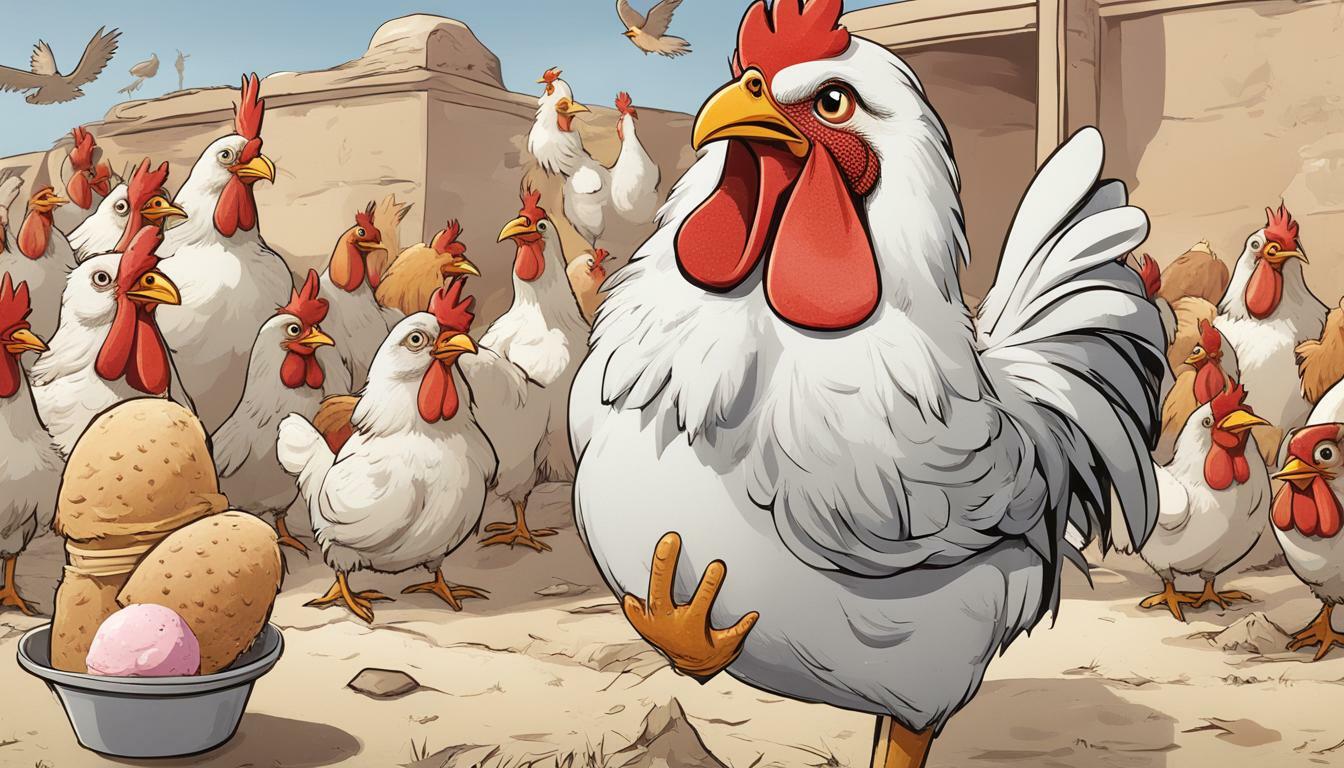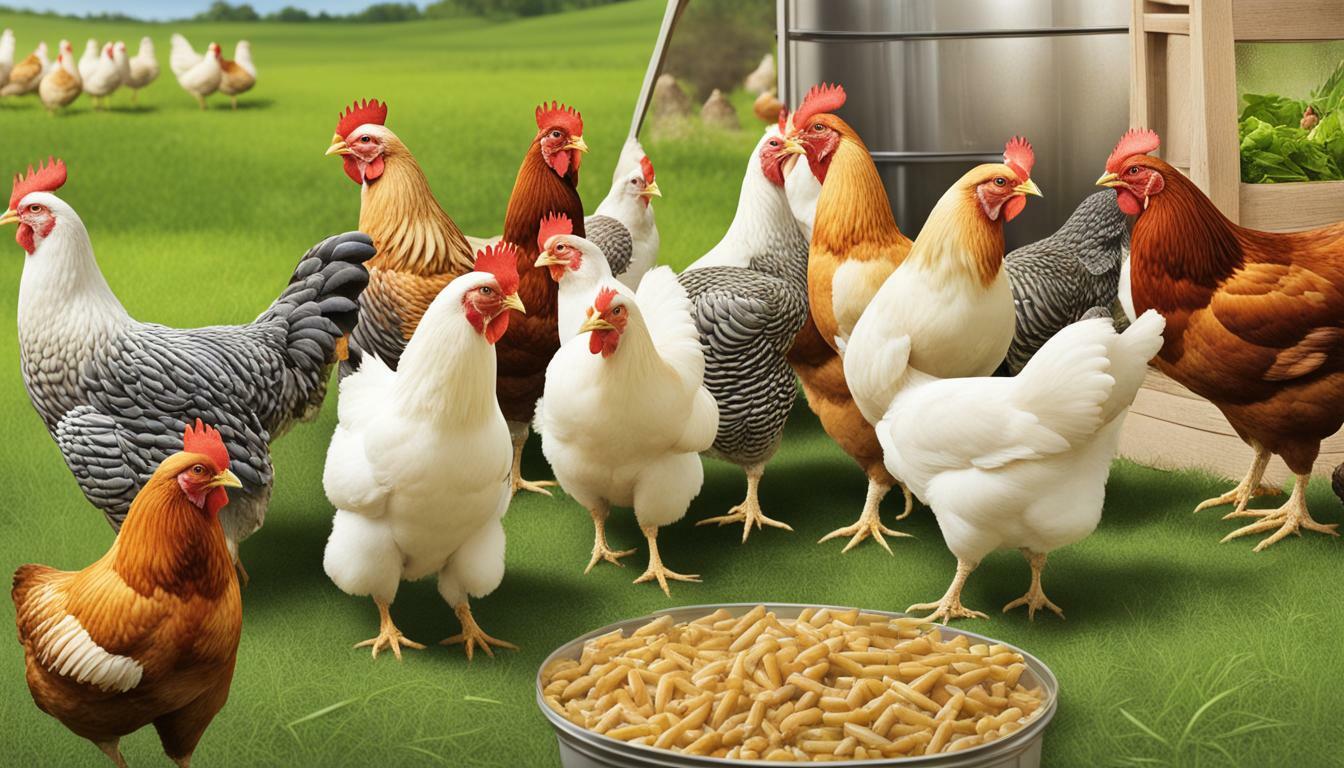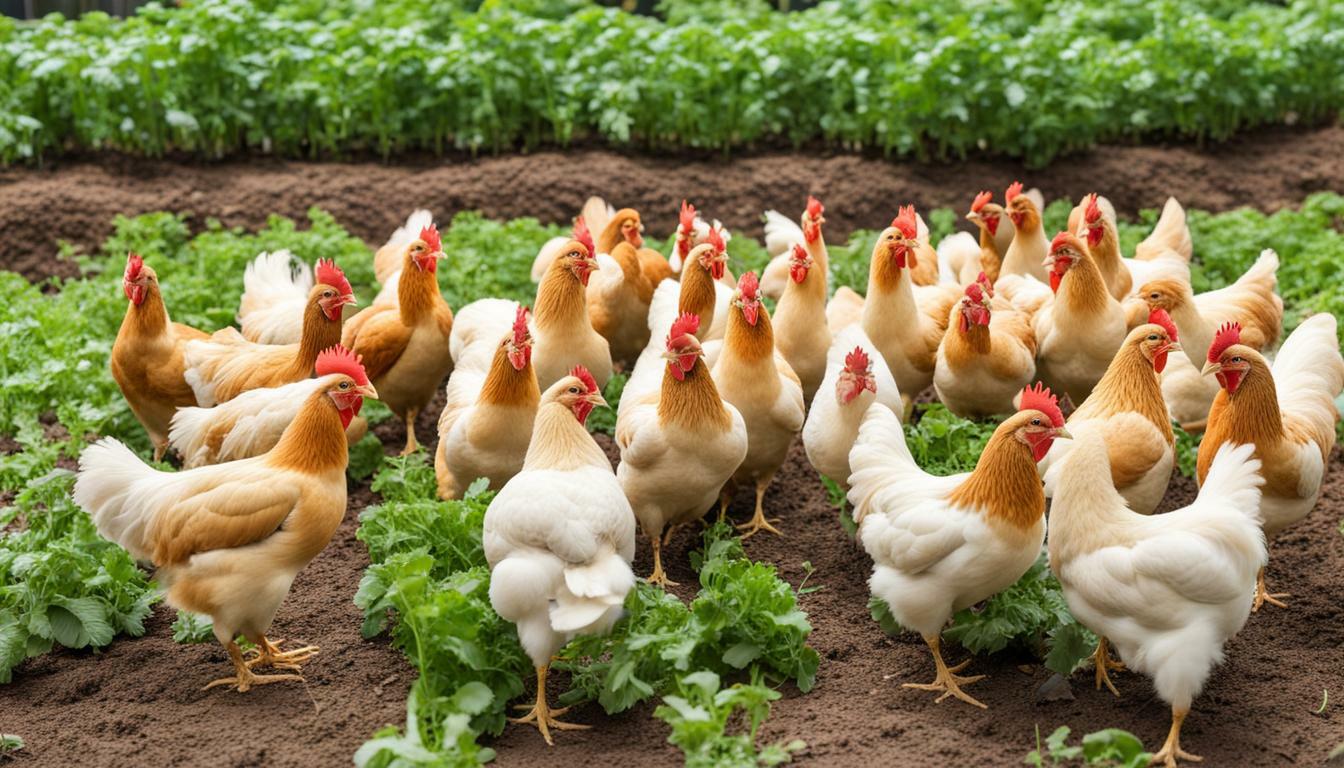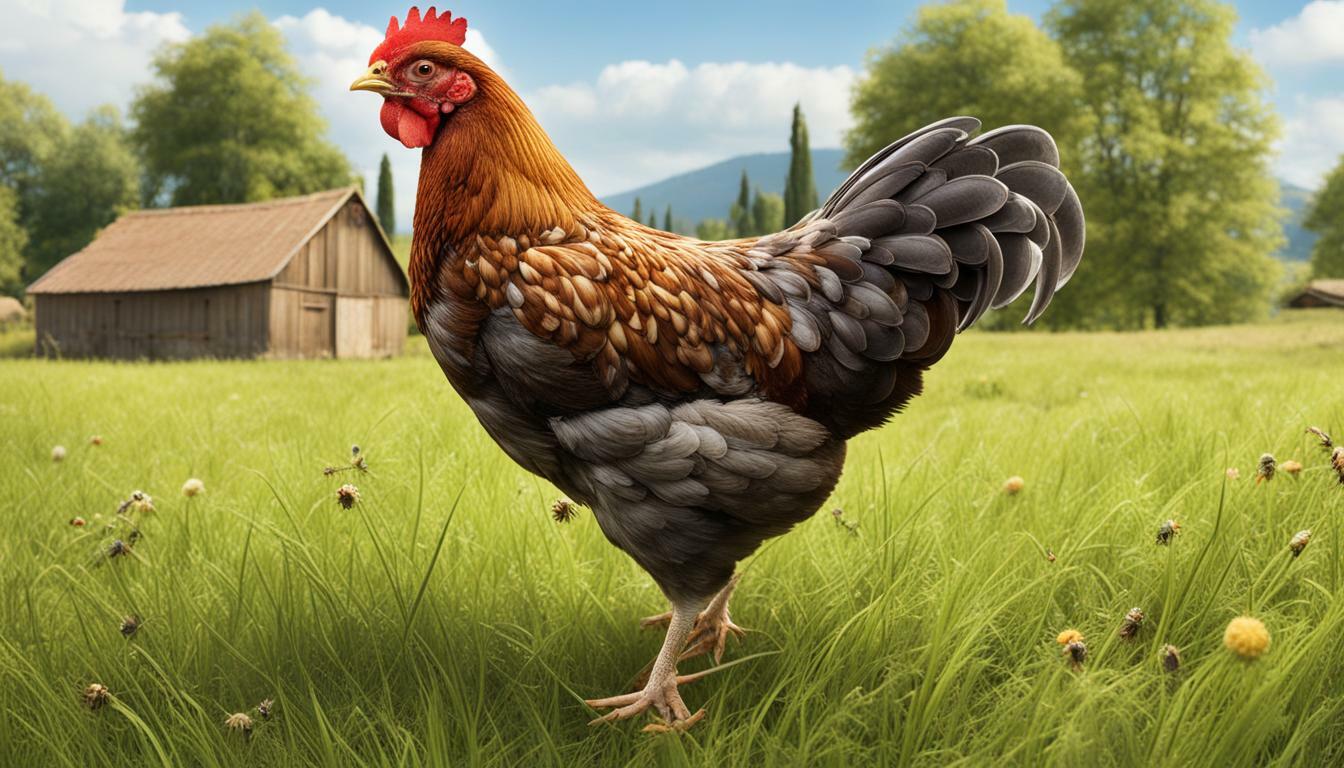Can Chickens Eat Ice Cream? The Surprising Truth Unveiled!

Table of content:
- Is Ice Cream Okay for Chickens to Eat?
- What Happens If Chickens Eat Ice Cream?
- Is Ice Cream Bad for Chickens?
- Why Can’t Chickens Eat Ice Cream?
- Do Chickens Like Ice Cream?
- What Desserts Can Chickens Eat?
- Are Dairy Products Okay for Chickens?
- Should You Feed Ice Cream to Backyard Chickens?
- Can Too Much Ice Cream Make Chickens Sick?
- Final Thoughts
Ice cream is a frozen dairy dessert that’s loved by many people for its sweet, creamy taste. If you have backyard chickens, you may have wondered if it’s okay to share some of your ice cream with them. So, can chickens eat ice cream?
Is Ice Cream Okay for Chickens to Eat?
While ice cream may seem like a fun treat to offer chickens, it’s generally not recommended for chickens to eat ice cream. Ice cream contains milk and cream, which are dairy products. Most chickens are lactose intolerant, meaning they lack the enzyme needed to properly digest lactose, the natural sugar found in dairy products.
Feeding chickens ice cream can lead to digestion problems like:
- Diarrhea
- Crop impaction
- Weight gain
Ice cream is also very high in sugar. Too much sugar can cause issues like:
- Obesity
- Fatty liver disease
- An increased risk of health problems
So while small amounts of ice cream won’t immediately harm them, it’s best to avoid feeding ice cream to chickens.
What Happens If Chickens Eat Ice Cream?
When chickens eat ice cream, the lactose and sugar in the ice cream are difficult for them to digest properly.
The lactose can cause their gut pH to become more acidic, leading to diarrhea. The undigested lactose may also draw extra water into the gut, resulting in watery droppings.
The high sugar content can disrupt the chickens’ gut bacteria balance. Overgrowth of unhealthy bacteria can also cause diarrhea.
Too much ice cream can also cause chickens’ crops to become impacted. Their crop is part of their digestive system used for initial food storage. But unusual foods like ice cream may get “stuck”, causing a potentially serious blockage.
Weight gain is another potential issue, as the high calories and fat content in ice cream can quickly lead to obesity if chickens eat too much.
Overall, while a small taste of ice cream won’t immediately make a chicken sick, it’s not a healthy treat option for backyard chickens. It’s better to stick to more natural, nutritious treats.
Is Ice Cream Bad for Chickens?
Ice cream isn’t highly toxic to chickens, but the dairy and sugar can cause digestive upset. Some specific concerns about ice cream for chickens include:
- Lactose Intolerance – Most chickens cannot properly digest lactose. Consuming dairy leads to diarrhea.
- Crop Impaction – Ice cream may get stuck in chickens’ crops, potentially blocking them. This can be life-threatening.
- Obesity & Fatty Liver Disease – The high fat and sugar content can lead to excessive weight gain and related health issues.
- Bacterial Contamination – Ice cream made with raw eggs or milk may contain Salmonella and make chickens sick.
- Chocolate Toxicity – Chocolate ice cream contains theobromine and caffeine, which chickens cannot metabolize well.
Overall, while a spoonful likely won’t cause immediate issues, ice cream should be considered an unhealthy, unsafe treatment option for chickens best avoided.
Why Can’t Chickens Eat Ice Cream?
The main reasons chickens can’t safely eat ice cream include:
- Lactose Intolerance – Chickens do not produce the lactase enzyme needed to digest lactose, leading to digestive upset.
- High Sugar Content – Too much sugar disrupts gut health and bacteria. It also leads to weight gain if eaten regularly.
- Raw Dairy Contamination – Raw dairy products may contain harmful bacteria like Salmonella that make chickens sick.
- Crop Impaction Risk – Chickens’ crops can become blocked and impacted if they eat sticky, gooey foods like ice cream.
- Fat Content – The high fat content of ice cream can lead to obesity and related health problems in chickens.
- Chocolate Toxicity – Chocolate ice cream contains theobromine and caffeine, which are toxic to chickens.
Even though chickens may enjoy the sweet taste of ice cream initially, their bodies are not equipped to digest ice cream properly. Chickens have different nutritional requirements and a much more sensitive digestive system than humans. Overall ice cream is not a healthy, safe treat to feed chickens.
Do Chickens Like Ice Cream?
Since ice cream is sweet and creamy, chickens are often curious about it and may enjoy licking a bit off your spoon if they have the chance. But while chickens may like the taste, ice cream is not actually good for them.
Chickens have taste receptors for sweet flavors just like humans do. This means they can enjoy sweet treats. However, they should not eat large amounts of sugar, as chickens are prone to developing fatty liver disease, metabolic disorders, and other health issues related to an unhealthy diet.
Ice cream is essentially just a sugary, frozen dairy dessert. Chickens do not need any dairy in their diet as they are lactose intolerant. Backyard chickens will get plenty of calcium from eggshells. The high sugar and fat content of ice cream makes it a junk food for chickens.
So while chickens may find it tasty, ice cream should only be an occasional treat in very small amounts, if at all. Chickens’ preferences don’t always match up with what is nutritious and healthy for them to eat. As backyard chicken keepers, it’s our responsibility to provide more wholesome, nutritious treats instead.
What Desserts Can Chickens Eat?
Chickens love treats, but unhealthy human dessert foods like ice cream should be avoided. Here are some healthier dessert options chickens can enjoy:
- Fruit – Small pieces of sweet fruits like watermelon, berries, melons, peeled apples, oranges, etc. Provide healthy sugars.
- Yogurt – Plain, unsweetened yogurt. Provides probiotics.
- Cooked Pumpkin – Natural source of vitamin A and fiber.
- Mealworms – High in protein, a tasty “candy” chickens love.
- Vegetables – Sweet veggies like corn, bell pepper, parsnip, peas, and winter squash.
- Chicken Treats – Healthy commercial treats made just for chickens.
- Whole Grains – Cooked brown rice, barley, millet. Provides lasting energy.
The key is to stick with natural, unprocessed treats that offer real nutrition instead of empty calories. Moderation is important as well. Treats should only make up a small part of chickens’ overall diet.
Are Dairy Products Okay for Chickens?
Most dairy products are not recommended for chickens. Chickens are lactose intolerant, meaning they lack the enzyme (lactase) needed to properly digest lactose, the main carbohydrate found in dairy products.
When chickens eat dairy products like milk, cheese, yogurt, or ice cream, the undigested lactose in their intestines draws in excess fluid. This leads to loose, watery droppings, or diarrhea.
The high fat content in many dairy products can also lead to obesity and related health issues over time. Plain yogurt with live cultures is the only dairy product that can be an occasional treat due to its probiotic benefits. But all dairy should be avoided as staples in chickens’ diet.
Chickens naturally get all the calcium and protein they need from their layer feed and eating bugs. Backyard chickens that eat a balanced diet do not require any additional dairy for nutrition or health.
Should You Feed Ice Cream to Backyard Chickens?
No, backyard chicken keepers should avoid feeding ice cream to their flock. While chickens may enjoy the sweet flavor, ice cream provides no nutritional value for chickens.
Ice cream is essentially junk food for chickens. It often contains unhealthy ingredients like:
- Excess sugar – Disrupts gut health. Leads to weight gain and fatty liver disease. Offers empty calories.
- Dairy – Chickens are lactose intolerant. May cause diarrhea.
- Fat and cholesterol – Chickens prone to obesity and arterial plaques.
- Artificial flavors and colors – Provides no nutrition. Can be toxic over time.
- Bacterial contamination – Potential foodborne illnesses from raw milk or eggs.
Chickens have very simple nutritional needs – they require a balanced layer feed, calcium from eggshells or supplements, and protein from bugs or supplements. Ice cream does not fit into a healthy diet for backyard chickens.
There are many healthier treats that provide real nutrition, like fruits, veggies, herbs, and mealworms. Use these natural options instead to show your chickens some extra love!
Can Too Much Ice Cream Make Chickens Sick?
Yes, feeding chickens too much ice cream could make them sick for several reasons:
- Crop Impaction – The cold, gooey texture may block a chicken’s crop leading to a serious issue. Surgery may be needed to clear the obstruction.
- Diarrhea – Excess dairy and sugar ingestion often cause loose droppings. Can lead to dehydration.
- Obesity – Too many extra calories can quickly lead to excessive weight gain and related issues.
- Fatty Liver Disease – Excess fat consumption causes dangerous fat deposits in chickens’ liver. Life-threatening condition.
- Digestive Issues – Significant dietary changes disrupt chickens’ gut health and pH balance.
- Nutritional Deficiencies – Junk foods like ice cream provide zero nutrition. Deficiencies may develop over time.
- Reduced Egg Production – Excess weight and nutritional imbalance lowers egg-laying over time.
Feeding chickens appropriate treats is part of responsible flock care. But ice cream should be avoided, and moderation is key even with healthy options. Too much of any treatment can lead to issues.
Final Thoughts
Ice cream may seem like a fun idea to share with backyard chickens. However, the high sugar, fat, and dairy content make ice cream an unhealthy choice for chickens. While a small taste won’t immediately harm them, ice cream is difficult for chickens to digest and provides no real nutrition. Chickens do not require any dairy products or added sugars in their diet.
Chicken keepers wanting to offer treats should look for healthier, more natural options like fresh fruits, vegetables, and proteins. Using ice cream as a regular treat will likely lead to obesity and other health issues over time. With proper education, chicken keepers can provide their backyard flocks with responsible care and the very best nutrition.
Welcome. I’m Adreena Shanum, the proud owner of this website, and I am incredibly passionate about animals, especially poultry. I founded adreenapets.com as a labor of love, stemming from my desire to share my knowledge and experiences with poultry enthusiasts worldwide.




